This website uses cookies so that we can provide you with the best user experience possible. Cookie information is stored in your browser and performs functions such as recognising you when you return to our website and helping our team to understand which sections of the website you find most interesting and useful.
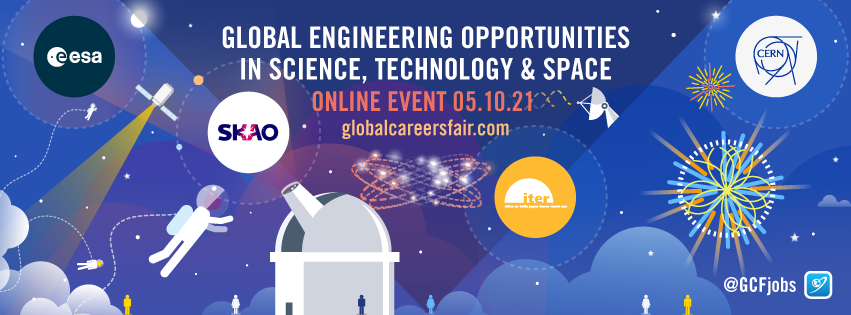
Global Engineering Opportunities in Science, Technology & Space
Online – Tuesday 5 October
Reach for the stars! Power up and accelerate your career
CERN, ESA, ITER and SKAO, leading organisations in the Science and Space industry, are joining forces to host a unique online information event.
Focusing mainly on Electrical Engineering, Computing and RF Systems, this online information event is a fantastic opportunity for candidates with a University Degree and who speak English fluently. In some cases, an additional European language will be considered an asset. Professional experience in related fields would be an asset.
This will be the chance to engage with CERN, ESA, ITER and SKAO’s representatives live one-on-one from the safe comfort of your home or office, via a computer, smartphone or tablet.
Who better than these organisations to offer you access to cutting edge technology and front-line scientific research in a truly international and diverse working environment?
Additionally, you will have the opportunity to interact through a live video session to find out more behind the scenes of these fantastic organisations, their working culture and much more!

Global Engineering Opportunities in Science, Technology & Space
Online – Tuesday 5 October
Come meet CERN, ESA, ITER and SKAO and find out more about these unique organisations and their opportunities in electrical engineering, computing and RF systems.
Essential Criteria to access the event:
- Nationality of one of the Members/States of the organisation(s) you are interested in (please visit each booth to see the full list for each organisation)
- A university degree in Electrical Engineering, Computing or RF Systems
- A minimum of 3 years’ related work experience
- Fluent English. In some cases, an additional European language will be an asset
Why register for this event?
You’ll receive early access to participating organisation information and opportunities.
Choose which organisation you want to interact with and then engage in one-on-one, text-based conversations directly with a representative at those organisations, without leaving your office or home.
You can share your background, experience, résumé and ask questions. Maximize your participation in the event in advance by preparing your questions, take time to check out the opportunities available in each organisation.
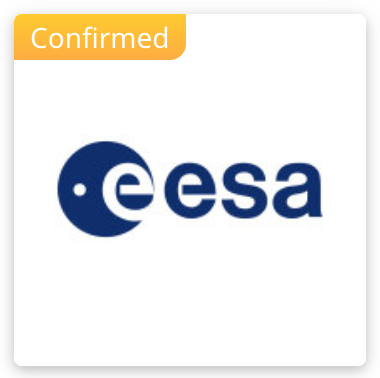
The European Space Agency (ESA) is Europe’s gateway to space. Its mission is to shape the development of Europe’s space capability and ensure that investment in space continues to deliver benefits to the citizens of Europe and the world.
ESA is an international organisation with 22 Member States. By coordinating the financial and intellectual resources of its members, it can undertake programmes and activities far beyond the scope of any single European country.
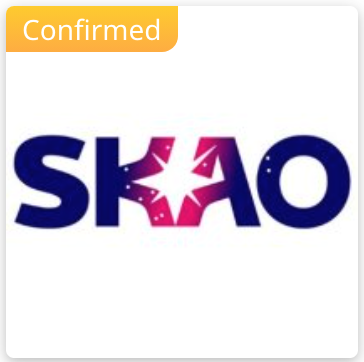
The Square Kilometre Array (SKA) project is an international effort to build the world’s largest radio telescope, with eventually over a square kilometre (one million square metres) of collecting area. The scale of the SKA represents a huge leap forward in both engineering and research & development towards building and delivering a unique instrument, with the detailed design and preparation now well under way. As one of the largest scientific endeavours in history, the SKA will bring together a wealth of the world’s finest scientists, engineers and policy makers to bring the project to fruition.
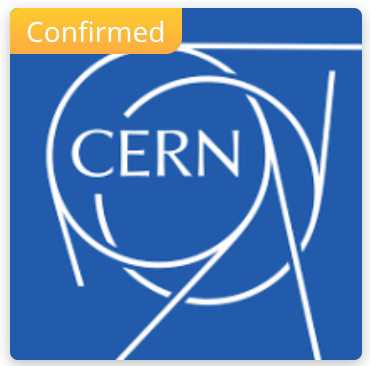
At CERN, the European Organization for Nuclear Research, physicists and engineers are probing the fundamental structure of the universe. They use the world’s largest and most complex scientific instruments to study the basic constituents of matter – the fundamental particles, which are made to collide together at close to the speed of light. The process gives the physicists clues about how the particles interact and provide insights into the fundamental laws of nature.
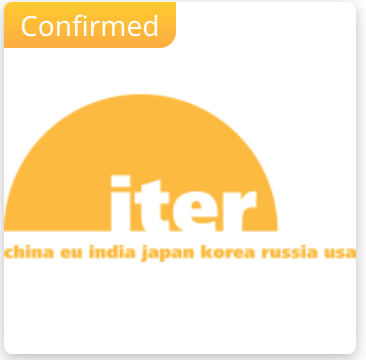 In southern France, 35 nations are collaborating to build the world’s largest tokamak, a magnetic fusion device that has been designed to prove the feasibility of fusion as a large-scale and carbon-free source of energy based on the same principle that powers our Sun and stars.
In southern France, 35 nations are collaborating to build the world’s largest tokamak, a magnetic fusion device that has been designed to prove the feasibility of fusion as a large-scale and carbon-free source of energy based on the same principle that powers our Sun and stars.
